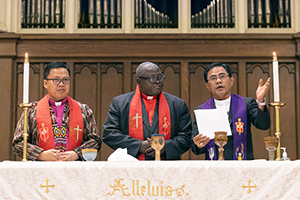Key points:
- Delegates to The United Methodist Church approved four changes to church law intended to remove the last remnants of restrictions aimed specifically at LGBTQ people.
- This comes after a week of slowly removing bans and enforcement measures against gay clergy and same-sex weddings.
- The delegates also passed a measure that explicitly allows clergy to choose which weddings they perform or don’t perform.
United Methodist pastors no longer face potential penalties for officiating at same-sex weddings or being in a same-sex relationship themselves.
During the afternoon session of General Conference’s final day, delegates approved four changes to church law that together end remaining bans related to homosexuality and protect the rights of pastors to choose which weddings to perform or not to perform.
With the day’s actions, the delegates removed decades of additions to the Book of Discipline, the denomination’s policy book, creating restrictions aimed specifically at LGBTQ people.
Previously, General Conference removed a longtime ban on “self-avowed practicing” gay clergy, eliminated a half-century-old statement against homosexuality and opened the door to accepting marriage between two consenting adults as well as a man and a woman.
By a vote of 447 to 233, delegates struck down a ban, added by the 1996 General Conference, that prohibited clergy from officiating and churches from hosting “homosexual unions.”
In other actions:
- By a vote of 544 to 121, delegates approved a change to the requirements that clergy practice “celibacy” in singleness — an addition made in 1984 that targeted gay candidates for ministry.
Instead, the delegates supported adding after the requirement of integrity in all personal relationships, “social responsibility and faithful sexual intimacy expressed through fidelity, monogamy, commitment, mutual affection and respect, careful and honest communication, mutual consent, and growth in grace and in the knowledge and love of God.”
- By a vote of 474 to 206, delegates approved striking from church law the chargeable offenses for “practices declared by The United Methodist Church to be incompatible with Christian teachings, including but not limited to: being a self-avowed practicing homosexual; or conducting ceremonies which celebrate homosexual unions; or performing same-sex wedding ceremonies.”
In the same vote, the delegates maintained the chargeable offense of immorality. However, delegates did not approve a proposal to add the definition “including, but not limited to, not being celibate in singleness, or not faithful in a marriage.”
- By a vote of 479 to 203, delegates adopted the statement: “No clergy at any time may be required to provide for or compelled to perform, or prohibited from performing, any marriage, union, or blessing. All clergy have the right to exercise and preserve their conscience when requested to perform any marriage, union, or blessing."
The Rev. Joy Barrett, a delegate from the Michigan Conference, said passing this last petition was critical as The United Methodist Church sets a new direction.
“No one will be forced to perform a marriage,” she said. “That remains the decision of the pastor. This wording was intentionally added to support our clergy who hold traditional understandings of marriage. We are a big-tent church. You are seen and valued.”
Hahn is assistant news editor for UM News. Contact her at (615) 742-5470 or newsdesk@umnews.org. To read more United Methodist news, subscribe to the free daily or weekly Digests.




